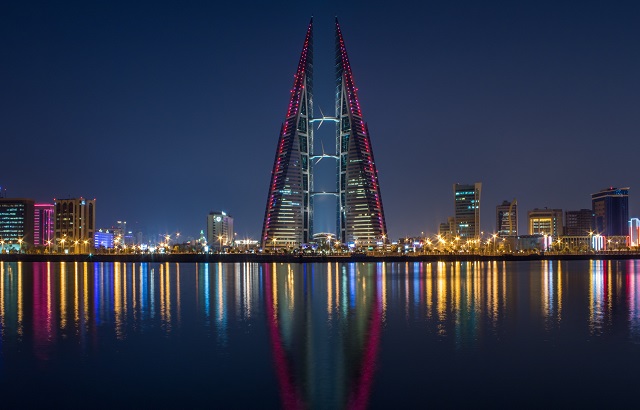There is a vast sum of wealth in the Middle East and, subsequently, a need for a strong financial advice industry to help people take care of their affairs.
Just over half of Bahrain’s population is made up of expatriates.
This seems low when compared with the UAE, where nearly 90% of the population are expats.
But when measured against the the UK, where it stands at less than 15%, it is a staggering proportion of Bahrain’s population.
This makes the need for accessible advice even greater, especially as many people are likely to have cross-border assets or financial planning needs.
But is the financial advice market big enough to cater for such globalised clients?
Offering
Ryan Frost, private client adviser at Harrison Brook, said: “Local banks offer financial advice, but we have seen that most of the time, due to their transient way of life, expats often prefer working with independent advisers that can recommend them products and services that are regulated in their home region rather than only in Bahrain.
“Even though there are mainly expats there, we have seen from our clients that the offering isn’t enough; as many of them come to us for more transient fee-based solutions.”
Omar Omari, director of private banking at EFG Private Bank, said: “There are a large number of licensees, more than 50, that provide wealth management and investment advisory services, so I would consider it a relatively mature sector.
“However, the framework that is used to deliver financial advice is not as progressive as in the UK.”
Gaenor Jones, regional director of the Middle East at the Chartered Insurance Institute (CII), described Bahrain “as one of the GCC’s most established financial hubs”.
“Bahrain is home to a robust and progressive financial services sector populated by more than 400 local, regional and global financial institutions,” she said.
“It is also regarded as one of the most experienced practitioners of Islamic banking in the region. It’s no surprise then that the financial services sector alone is the largest non-oil contributor to Bahrain’s real GDP, and it continues to grow year-on-year.”
Investment firms
But the size and accessibility of the financial advice market is only half the story, as investors in the region need to put their assets into easily investable funds.
The total assets under management held by investment firms in Bahrain is $19.2bn (£14.4bn, €15.9bn), with an average growth of 16% per annum recorded over the past five years, according to latest statistics.
Jones said: “Bahrain’s business environment is constantly evolving, through the simplification of processes, billion-dollar investments in infrastructure and real estate, and improved regulatory initiatives.
“This growth in assets is mainly due to the entrance of new investment firm licensees to the market and the introduction of new innovative products and structures by existing firms.”
But Frost said there are a limited number of investment opportunities outside of oil.
“Investment opportunities in Bahrain vary but, as in any of the Gulf states, lots of investment opportunities are in oil; which, considering the recent fluctuations in price, could be something expats might want to avoid for the time being,” he said.
“Oil revenue makes up the majority of Bahrain’s revenue and, it being massively down, this is leaving Bahrain in a more difficult financial position.”
Regulation
As well as opportunities for advice and investments, another key factor is regulation.
The market has been improving for expats in the UAE, as regulators continue to introduce rules for firms to get the country on par with advice markets like the UK and the US.
Harrison Brook’s Frost said that the Central Bank of Bahrain (CBB) regulates the financial sector, and any local investment needs to abide by it, “which might not always be enough for expats used to western regulations”.
CII’s Jones said: “The regulator has put tremendous efforts into regulating the financial advice sector. Any individual, whether client facing or back-office, involved in providing financial advice must undergo a series of ongoing trainings before being approved for the role by the regulator.
“The CII has worked closely with the CBB for many years and is an avid supporter of raising professional standards in Bahrain and the wider GCC.
“We are working very closely with well-established, experienced training companies in the region to provide insurance and financial planning professionals with internationally recognised qualifications that adhere to best practice and the CII code of ethics.”
State of the economy
The coronavirus has taken its toll on many economies across the world, which has stunted growth.
Bahrain has also had its fair share of financial problems, especially as its main export is oil.
A recent survey conducted by the Chamber of Commerce revealed that 83% of business owners have been impacted by the decision to close commercial and industrial businesses to prevent the spread of coronavirus in Bahrain.
The Kingdom of Bahrain launched a BHD4.3bn (£8.6bn, $11.4bn, €9.4bn) economic stimulus package to support the country’s citizens and private sector and to counter the effects of covid.
“Coronavirus has badly affected the financial state of the country, the price of crude oil having plummeted, the country had a very difficult time for the first half of 2020,” Frost said.
EFG’s Omari added: “Public funding has increased and may have impacted treasury. Businesses across the country this year, and across all sectors, have been hard hit; with volumes immensely reduced and with little by way of government support, relative to their peers in the GCC.”
Long-term plans
Despite the covid-19 pandemic, Bahrain has big plans for its financial advice market.
Frost believes that as fee-based advice is becoming the norm around the globe, “it is likely that the same will happen in Bahrain”.
Jones added: “Bahrain is one of the countries that leads the GCC in nurturing and encouraging the growth of digital financial services.
“A move to embrace the fintech industry with the development of Bahrain fintech bay, one of the region’s largest fintech hubs, further elevates the country.”
Omari said that despite “remarkable growth rates over the past decade” in the sector, “in the near term, however, the development of the industry in the kingdom is expected to stutter, with the number of authorised funds and net asset value of those funds expected to continue contracting across the course of this year and next due to headwinds caused by covid.”
Progression
Recently, the CII struck a deal to be the exclusive provider of professional examinations to the students of the Financial Academy for the Kingdom of Saudi Arabia (KSA) for the next three years.
Bahrain will have to adopt similar measures to compete with the rest of the GCC.
Frost said: “If fee-based advice does become more common in Bahrain then I do believe that the likes of the CII and similar associations promoting good practice will be key to improving the wealth management sector in the country.”
Jones added: “It is vital that the CII continues to work closely with and support the CBB so that professional standards can be maintained through the attainment of internationally recognised qualifications.
“As the sector evolves and embraces new challenges, advisers must be well informed, appropriately educated and highly responsive to the market’s needs; this is essential in instilling public trust and confidence and maintaining the reputation of the wealth management sector.”








